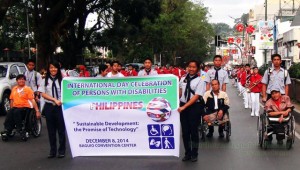
InterAksyon.com
The online news portal of TV5
The online news portal of TV5
BAGUIO CITY - A member of the Civilian Armed Forces Geographical Unit (CAFGU) from the Saclit tribe of Sadanga, Mountain Province allegedly shot to death his commanding officer and then performed a "tomo," a ritual followed by his tribe when a warrior kills a person or an enemy.
According to a Sadanga police report, Antonio Cassiw Jr., a member of the Saclit tribe of Sadanga, shot to death his CO Sgt. Jerry C. Cuntapay, 46, using his official issue M14 rifle.
The report stated that the two arrived drunk and still continued with their drinking session at the 77 IB CAFGU battalion camp at Sitio Opokan, Poblacion, Sadanga between 9 pm to 10 pm on December 6, 2014, where the shooting occurred.
An altercation between the two then followed, after which Cassiw apparently proceeded to his guard post followed by Cuntapay. A shot rang out and the army officer's body was found by responding CAFGU men sprawled on the ground.
A medical report showed that Cuntapay was shot at the back of his head with bullet apparently exiting from his face.
Sadanga Mayor Gabino Ganggangan said that Cassiw, whom he confirmed to be from the Saclit tribe, is the subject of a manhunt by the town's policemen.
After performing the tomo, Cassiw fled, but barangay officials of Saclit turned over to the PNP the M14 rifle issued to Cassiw and the M16 Armalite rifle of Cuntapay, who has served the Philippine Army for 25 years.
A murder case was filed against Cassiw at the Regional Trial Court in Bontoc, Mountain Province based on testimonies of the other CAFGU soldiers and the "tomo" ritual that he had immediately performed after the killing.
An elder from Sadanga explained that "tomo" ritual is performed when someone kills a person. The killer is dressed in a warrior's attire during the ritual and members of his "ator" or indigenous circle also join in.





